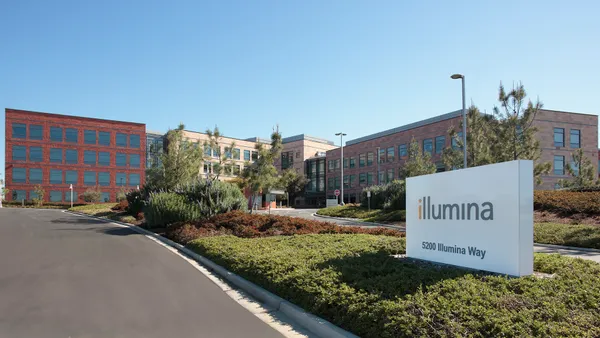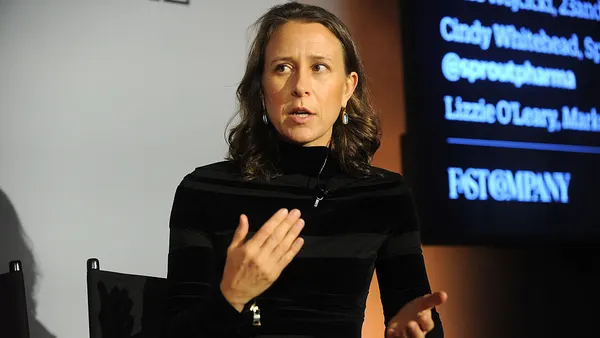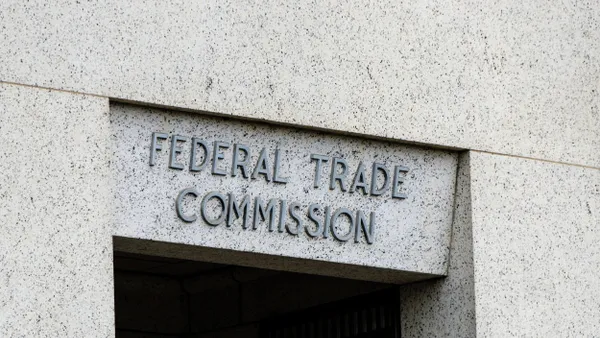Dive Brief:
- In a $21.4 billion deal, General Electric will narrow its portfolio by selling its biopharma business to Danaher, a Washington, D.C.-based corporation that has become a larger player in life sciences over the past few years through acquisitions.
- The massive all-cash deal will greatly boost Danaher's $6.5 billion life sciences unit, with the GE business expected to post $3.2 billion in revenue this year. For GE, an American industrial stalwart that has faced troubles in recent years, the sell-off brings in much-needed cash to reduce leverage and strengthen its balance sheet.
- Shares in GE opened up nearly 14%, while Danaher was up 9% after the companies announced the agreement Monday morning. The deal is expected to close in the fourth quarter of 2019 and will reportedly pause plans to spinoff GE Healthcare as its own company through an IPO.
Dive Insight:
While GE embarks on a road of significant restructuring under its new CEO, Larry Culp, Danaher will grow one of its core business areas in life sciences through the big buyout.
Danaher expects the net purchase price to come in at about $20 billion after taking into account anticipated tax benefits from the deal's structure. Beyond using cash on hand along with new debt or credit facilities, the company expects to raise about $3 billion through an equity offering to finance the buyout.
The broader Danaher Corporation is composed of more than 20 operating companies in four business units: diagnostics, dental, life sciences, and environmental and applied solutions.
Once the deal completes, the GE unit will operate as a standalone company within Danaher's life sciences business, which is already a medley of previously acquired companies. The business made about $6.5 billion in revenue last year, more than double the $2.4 billion the unit posted five years prior, according to a recent company presentation.
Over those years, Danaher has grown through buyout after buyout, although none on the size of this GE deal. In 2016, for instance, it bought the molecular diagnostics and medical testing business Cepheid for about $4 billion. Last year, it bought Integrated DNA Technologies, a gene-sequencing and editing company, for $2 billion.
Analysts from Evercore ISI called the GE deal a "multi-year home run" for Danaher, characterizing the deal as one shareholders "have been clamoring for." Danaher said the GE unit is set to bring long-term growth in supporting cell and gene therapies and development of biologics.
Another analyst, Dan Brennan of the investment bank UBS, said it "looks like a great fit" for Danaher, particularly given how it fits with a previous acquisition of Pall, he wrote in a Feb. 25 note to investors.
"We view the acquisition as highly strategic, as [Danaher] gains access to GE's coveted bioprocessing assets, where GE is the leader in downstream chromatography, highly complementary to Pall's upstream dominant filtration position — not to mention GE's high margin upstream business in cell culture and single use technologies," Brennan wrote.
For GE, the biopharma business is a relatively small chunk of its larger healthcare business. The biopharma unit sells instruments, consumables and software to support R&D and manufacturing for drugs. The remaining parts posted about $17 billion in revenue last year, the company stated, with operating profit margins in the mid-teens.
The sell-off throws cold water on the giant's plans to spin out GE Healthcare through an IPO, Culp said in a Monday interview with Bloomberg. GE Healthcare had filed confidential paperwork to begin the IPO process last December.
Instead, the company will prioritize completing the Danaher deal while retaining the rest of its healthcare unit.
"We're going to focus on improving our core imaging business while we evaluate other options," Culp said in the Bloomberg interview. "It's unlikely we would do something here in the near to medium term."
Culp took over as head of GE in October, after John Flannery was ousted from the CEO spot. Culp, the first outsider to lead the company in its history, has made restructuring a priority in turning the company around.














